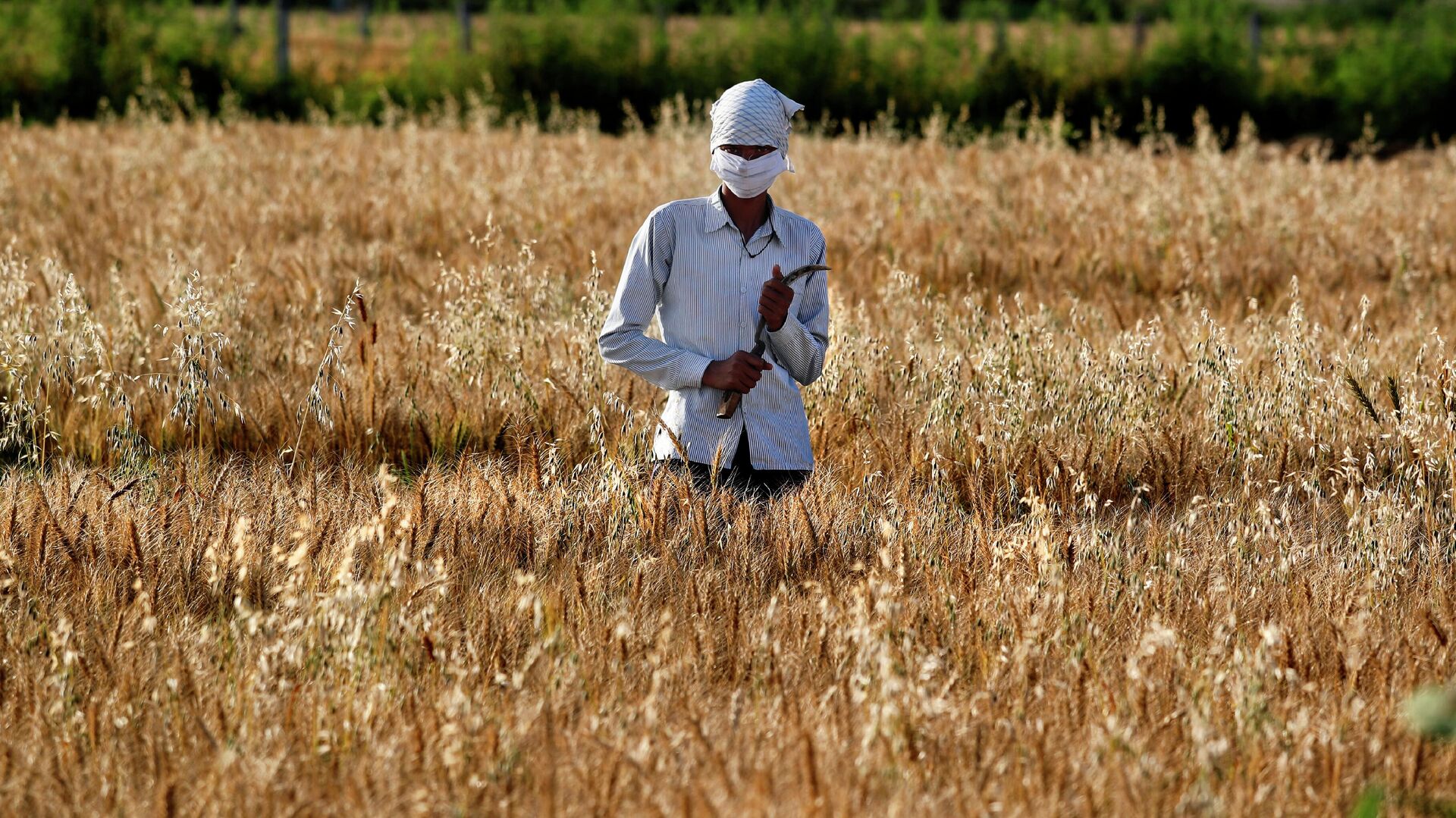https://sputnikglobe.com/20220525/i-beg-india-to-reconsider-wheat-export-ban-says-international-monetary-fund-chief-1095754236.html
'I Beg India to Reconsider Wheat Export Ban,' Says International Monetary Fund Chief
'I Beg India to Reconsider Wheat Export Ban,' Says International Monetary Fund Chief
Sputnik International
Earlier this month, India cut back its wheat exports, a decision which caused its US and many European allies great anxiety. Washington has said it is "deeply... 25.05.2022, Sputnik International
2022-05-25T10:50+0000
2022-05-25T10:50+0000
2024-01-14T17:40+0000
russia
ukraine
wheat
wheat exports
wheat
world economic forum in davos
imf chief
imf
imf
davos
https://cdn1.img.sputnikglobe.com/img/07e6/05/13/1095626798_287:0:3928:2048_1920x0_80_0_0_bb21342cb35f2e52c7d33102a5a7146d.jpg
International Monetary Fund (IMF) chief Kristalina Georgieva has urged India to reconsider its ban on wheat exports after the global price of the commodity has shot up at least 40 percent in the past three months."Because the more countries that erect export restrictions, the more others will be tempted to do so, and we will end up as a global community less equipped to deal with the crisis," she added.Before the start of Moscow's special military operation on 24 February, Ukraine and Russia combined accounted for more than 30 percent of the world's wheat supply. India is also a major wheat producer globally, but its crops have suffered because the wheat-growing areas of the country witnessed the hottest March on record in 122 years.Consequently, India put a ban on wheat export on 13 May that would "prohibit" exports to foreign countries for the sake of national "food security" and amid a "sudden spike in global prices".Many countries, including the Group of Seven, or G7 countries, condemned India's move to ban wheat exports."Wheat is one of the areas where Ukraine and Russia have been dramatically affected by the war, so depending on how much India can export and where it directs its exports, it could have a significant impact," the IMF chief said when asked how much it would help if India lifted its ban, "especially if exports go to countries most severely hit such as Egypt or Lebanon where what we see is not only risk of hunger but the risk of social unrest and impact on global stability," she added.The UN estimates that global food prices have risen by almost one third, fertiliser by more than half, and oil prices by almost two-thirds in the past year.It is also estimated that in Ethiopia, Somalia and Kenya, the number of people facing extreme hunger has more than doubled in 12 months, from roughly 10 million to more than 23 million.In these three countries, a person is likely to die every 48 seconds from acute hunger-related causes resulting from armed conflict, COVID-19, climate change and soaring inflation which is worsening after Russia's special military operation was launched in Ukraine.Last week, the United Nations Secretary-General António Guterres warned of "the spectre of a global food shortage in the coming months" unless urgent international action is taken.
ukraine
davos
Sputnik International
feedback@sputniknews.com
+74956456601
MIA „Rossiya Segodnya“
2022
Deexa Khanduri
https://cdn1.img.sputnikglobe.com/img/07e4/0c/1e/1081607388_0:0:961:960_100x100_80_0_0_e9e931b8c1e18fb41f3074e2145d7a3a.jpg
Deexa Khanduri
https://cdn1.img.sputnikglobe.com/img/07e4/0c/1e/1081607388_0:0:961:960_100x100_80_0_0_e9e931b8c1e18fb41f3074e2145d7a3a.jpg
News
en_EN
Sputnik International
feedback@sputniknews.com
+74956456601
MIA „Rossiya Segodnya“
Sputnik International
feedback@sputniknews.com
+74956456601
MIA „Rossiya Segodnya“
Deexa Khanduri
https://cdn1.img.sputnikglobe.com/img/07e4/0c/1e/1081607388_0:0:961:960_100x100_80_0_0_e9e931b8c1e18fb41f3074e2145d7a3a.jpg
ukraine, wheat, wheat exports, wheat, world economic forum in davos, imf chief, imf, imf, davos
ukraine, wheat, wheat exports, wheat, world economic forum in davos, imf chief, imf, imf, davos
'I Beg India to Reconsider Wheat Export Ban,' Says International Monetary Fund Chief
10:50 GMT 25.05.2022 (Updated: 17:40 GMT 14.01.2024) Deexa Khanduri
Sputnik correspondent
Earlier this month, India cut back its wheat exports, a decision which caused its US and many European allies great anxiety. Washington has said it is "deeply concerned" by New Delhi's position, and Germany has claimed that the curbs by India could "worsen" the global food security crisis.
International Monetary Fund (IMF) chief Kristalina Georgieva has urged India to reconsider its ban on wheat exports after the global price of the commodity has shot up at least 40 percent in the past three months.
"I appreciate the fact that India needs to feed nearly 1.35 billion people, and I do realise that the heatwave has reduced agricultural productivity, but I would beg India to reconsider as soon as possible," Indian news channel NDTV quoted the IMF chief as saying from the World Economic Forum in Davos, Switzerland.
"Because the more countries that erect export restrictions, the more others will be tempted to do so, and we will end up as a global community less equipped to deal with the crisis," she added.
Before the start of Moscow's special military operation on 24 February, Ukraine and Russia combined accounted for more than 30 percent of the world's wheat supply.
India is also a major wheat producer globally, but its crops have suffered because the wheat-growing areas of the country witnessed the hottest March on record in 122 years.
Consequently, India put a ban on
wheat export on 13 May that would "prohibit" exports to foreign countries for the sake of national "food security" and amid a "sudden spike in global prices".
Many countries, including the Group of Seven, or G7 countries, condemned India's move to ban wheat exports.
"Wheat is one of the areas where Ukraine and Russia have been dramatically affected by the war, so depending on how much India can export and where it directs its exports, it could have a significant impact," the IMF chief said when asked how much it would help if India lifted its ban, "especially if exports go to countries most severely hit such as Egypt or Lebanon where what we see is not only risk of hunger but the risk of social unrest and impact on global stability," she added.
The
UN estimates that global food prices have risen by almost one third, fertiliser by more than half, and oil prices by almost two-thirds in the past year.
It is also estimated that in Ethiopia, Somalia and Kenya, the number of people facing extreme hunger has more than doubled in 12 months, from roughly 10 million to more than 23 million.
In these three countries, a person is likely to die every 48 seconds from acute hunger-related causes resulting from armed conflict, COVID-19, climate change and soaring inflation which is worsening after Russia's special military operation was launched in Ukraine.
Last week,
the United Nations Secretary-General António Guterres warned of "the spectre of a global food shortage in the coming months" unless urgent international action is taken.



